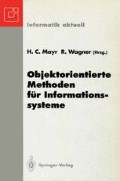Abstract
The object oriented (OO) approach is very popular nowadays. It has proved to be a powerful and practical programming paradigm for the development of large and complex software systems, including database management systems (DBMS). Among its many benefits are significant improvements in modularity, reusability, flexibility, and extensibility. The database community has already taken advantage of the OO approach and produced a number of OO DBMSs, much faster than in the case of the previous generation of relational systems.
Access this chapter
Tax calculation will be finalised at checkout
Purchases are for personal use only
Preview
Unable to display preview. Download preview PDF.
References
S. Abiteboul, P.C. Fischer, H. J. Scheck Eds.: Nested Relations and Complex Objects in Databases, Lectures Notes in Computer Science 361, Springer Verlag, 1989
A. Albano, G. Ghelli, R. Orsini: A Relationship Mechanism for a Strongly
Typed Object-Oriented Database Programming Language, 17th International Conference on Very Large Data Bases, Barcelona, September 3–6, 1991, pp. 565–575
A. Auddino & al.: SUPER: A Comprehensive Approach to DBMS Visual
User Interfaces, IFIP WG 2.6 2nd Working Conference on Visual Database Systems, Budapest, September 30-October 3, 1991, pp. 359–374
F. Bancilhon & al.: The Design and Implementation of 02, an Object-Oriented Database System, in Advances in Object-Oriented Database Systems, K.R. Dittrich Ed., Lecture Notes in Computer Science no 334, Springer-Verlag, 1988, pp. 1–22
E. Bertino, M. Negri, G. Pelagatti, L. Sbattella: Object Oriented Query Languages: The Notions and the Issues, IEEE Transactions on Data and Knowledge Engineering, Vol.4, No.3, June 1992, pp. 223–237
M. Brodie, J. Mylopoulos, J. Schmidt (Eds.): On Conceptual Modelling, Springer-Verlag, 1984
M. Carey, D. DeWitt, S. Vandenberg: A Data Model and Query Language for EXODUS, ACM-SIGMOD International Conference on Management of Data, Chicago, June 1–3, 1988, pp. 413–423
R. Elmasri, J. Weeldreyer, A. Hevner: The category concept: an extension to the entity-relations hip model, Data & Knowledge Engineering, Vol. 1, n° 1, June 1985, pp. 75–116
G. Jaeschke: Remarks on the Algebra of the Non First Normal Form Relations, ACM SIGMOD International Conference on Management of Data, Los Angeles, March 1982
S. Khoshafian, R. Abnous: Object Orientation — Concepts, Languages, Databases, User Interfaces, John Wiley & Sons, 1990
G. Loizou, P. Pouyioutas: A Query Algebra for an Extended Object-Oriented Database Model, International Symposium of Database System for Advanced Applications, Tokyo, April 1991
C. Parent, S. Spaccapietra: ERC+: an object based entity-relationship approach, in Conceptual Modelling, Databases and CASE: An Integrated View of Information Systems Development, P. Loucopoulos, R. Zicari Eds., John Wiley, 1992
J. Rumbaugh: Relations as Semantic Constructs in an Object-Oriented Language, OOPSLA Conference, Orlando, October 4–8, 1987, pp.466–481
M. Roth, H. Korth, A. Silberschatz:Thzeory of Non First Normal Form Relational Databases, TR-84–36 Department of Computer Science, University of Texas at Austin, December 1984
M.H. Scholl, H.-J. Schek: A Relational Object Model, 3rd International Conference on Database Theory, Paris, December 1990
S. Spaccapietra, C. Parent: Model Independent Assertions for Integration of Heterogeneous Schemas, The VLDB Journal, Vol.1, No 1, July 1992, pp.81–126
M. Sunye: CERQLE: un SQL entité-relationi, 7èmes Journées Bases de Données Avancées, Trégastel, September 15–18, 1992
S. V. Vrbsky, J. Liu and K Smith: An Object-Oriented Approach to producing monotonically improving approximate answers, Technical Report No. NVY N00014 89-J-1181 Dept. of Comp Science, Univ. of Illinois, Urbana-Champaign
C. Zaniolo, D. Maier: The Database Language GEM, ACM SIGMOD International Conference on Mangement of Data, San Jose, May 1983
Author information
Authors and Affiliations
Editor information
Editors and Affiliations
Rights and permissions
Copyright information
© 1993 Springer-Verlag Berlin Heidelberg
About this paper
Cite this paper
Spaccapietra, S., Parent, C., Sunye, M., Yétongnon, K. (1993). Object Orientation and Conceptual Modeling. In: Mayr, H.C., Wagner, R. (eds) Objektorientierte Methoden für Informationssysteme. Informatik aktuell. Springer, Berlin, Heidelberg. https://doi.org/10.1007/978-3-642-78270-1_1
Download citation
DOI: https://doi.org/10.1007/978-3-642-78270-1_1
Publisher Name: Springer, Berlin, Heidelberg
Print ISBN: 978-3-540-56775-2
Online ISBN: 978-3-642-78270-1
eBook Packages: Springer Book Archive

